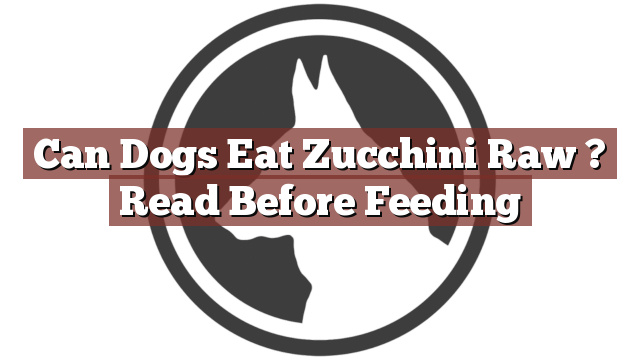Understanding Your Dog’s Dietary Needs
As a responsible pet owner, it is important to understand your dog’s dietary needs to ensure their overall health and well-being. While dogs are primarily carnivores, they can also benefit from incorporating certain fruits and vegetables into their diet. However, not all fruits and vegetables are safe for dogs to consume. This article will specifically address the question "Can dogs eat zucchini raw?" and provide you with important information to consider before feeding it to your furry friend.
Can Dogs Eat Zucchini Raw? Read Before Feeding
Can dogs eat zucchini raw? The answer is yes. Zucchini is safe for dogs to eat, both raw and cooked. It is a low-calorie vegetable that contains essential vitamins and minerals such as vitamin C, vitamin A, potassium, and dietary fiber. These nutrients can provide various health benefits for dogs, including improved digestion and a boost to their immune system. However, it is essential to introduce zucchini gradually into your dog’s diet to avoid any adverse digestive reactions.
Pros and Cons of Feeding Zucchini to Your Dog
Feeding zucchini to your dog can have several advantages. Firstly, its high water content can help keep your dog hydrated. Additionally, the fiber present in zucchini can aid in maintaining healthy bowel movements and preventing constipation. Moreover, zucchini is a great option for dogs who are on a weight management plan, as it is low in calories and can be used as a healthy, low-fat treat.
However, it is important to note that while zucchini is generally safe for dogs, there are a few considerations to keep in mind. Some dogs may have a sensitive stomach, and introducing zucchini too quickly or in large quantities can lead to digestive upset, such as diarrhea or vomiting. Furthermore, some dogs may have difficulty digesting the skin or seeds of zucchini, so it is advisable to remove them before feeding it to your furry friend. Lastly, always ensure that the zucchini is fresh and free from any potential contaminants or pesticides.
Conclusion: Considerations for a Balanced Canine Diet
In conclusion, zucchini can be a healthy addition to your dog’s diet when introduced in moderation. It is important to remember that while zucchini is safe for most dogs, individual sensitivities or allergies can vary. Therefore, it is advisable to consult with your veterinarian before introducing any new food into your dog’s diet, especially if they have any pre-existing health conditions.
When feeding zucchini to your dog, make sure to wash it thoroughly, remove the skin and seeds, and cut it into small, manageable pieces. This will help prevent any choking hazards or digestive issues. As always, monitor your dog closely after feeding them zucchini to ensure they tolerate it well.
Remember, a balanced diet for your dog should primarily consist of high-quality dog food that meets their specific nutritional requirements. While fruits and vegetables can be a healthy addition, they should never replace the core components of their diet. By understanding your dog’s dietary needs and making informed choices, you can ensure that they lead a happy and healthy life.
Thank you for taking the time to read through our exploration of [page_title]. As every dog lover knows, our furry friends have unique dietary needs and responses, often varying from one canine to another. This is why it's paramount to approach any changes in their diet with caution and knowledge.
Before introducing any new treats or making alterations to your dog's diet based on our insights, it's crucial to consult with a veterinarian about [page_title]. Their expertise ensures that the choices you make are well-suited to your particular pet's health and well-being.
Even seemingly harmless foods can sometimes lead to allergic reactions or digestive issues, which is why monitoring your dog after introducing any new food item is essential.
The content provided here on [page_title] is crafted with care, thorough research, and a genuine love for dogs. Nevertheless, it serves as a general guideline and should not be considered a substitute for professional veterinary advice.
Always prioritize the expert insights of your veterinarian, and remember that the health and happiness of your furry companion come first.
May your journey with your pet continue to be filled with joy, love, and safe culinary adventures. Happy reading, and even happier snacking for your canine friend!

